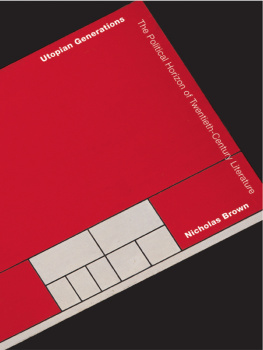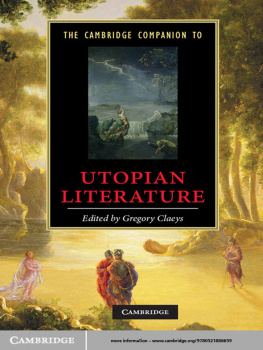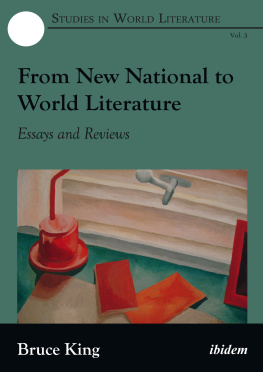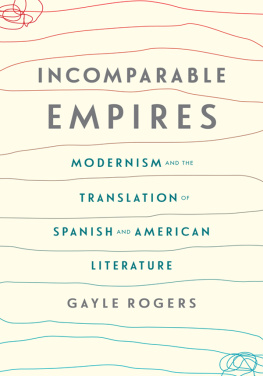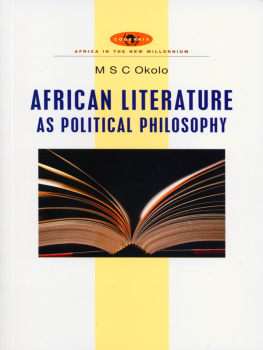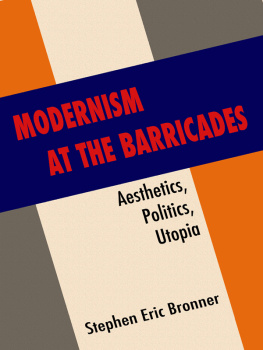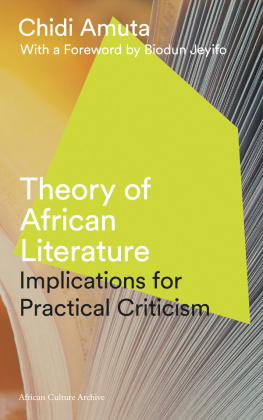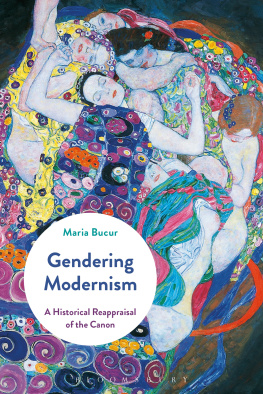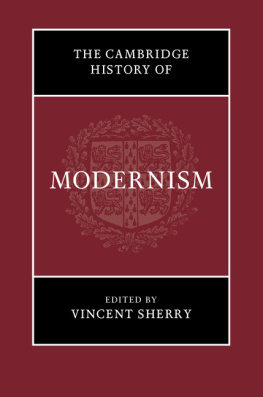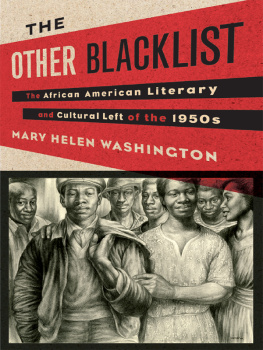Utopian Generations
TRANSLATION | TRANSNATION
EDITED BY EMILYAPTER
Writing Outside the Nation
BY AZADE SEYHAN
The Literary Channel: The Inter-National Invention of the Novel
EDITED BY MARGARET COHEN AND CAROLYN DEVER
Ambassadors of Culture: The Transamerican Origins of Latino Writing
BY KIRSTEN SILVA GRUESZ
Experimental Nations: Or, the Invention of the Maghreb
BY REDA BENSMAIA
What Is World Literature?
BY DAVID DAMROSCH
The Portable Bunyan: A Transnational History of The Pilgrims Progress
BY ISABEL HOFMEYR
We the People of Europe? Reflections on Transnational Citizenship
BY ETIENNE BALIBAR
EDITED BY SANDRA BERMANN AND MICHAEL WOOD
Nation, Language, and the Ethics of Translation
EDITED BY SANDRA BERMANN AND MICHAEL WOOD
Utopian Generations: The Political Horizon
of Twentieth-Century Literature
BY NICHOLAS BROWN
Guru English: South Asian Religion in Cosmopolitan Contexts
BY SRINIVAS ARAVAMUDAN
Utopian Generations:
THE POLITICAL HORIZON OF TWENTIETH-CENTURY LITERATURE
NICHOLAS BROWN
PRINCETON UNIVERSITY PRESS
PRINCETON AND OXFORD
Copyright 2005 by Princeton University Press
Requests for permission to reproduce material from this work should be sent to Permissions,
Princeton University Press
Published by Princeton University Press, 41 William Street, Princeton, New Jersey 08540
In the United Kingdom: Princeton University Press, 3 Market Place, Woodstock,
Oxfordshire OX20 1SY
All Rights Reserved
LIBRARY OF CONGRESS CATALOGING-IN-PUBLICATION DATA
Brown, Nicholas, 1971
Utopian generations : the political horizon of twentieth-century literature / Nicholas Brown.
p. cm.(Translation/transnation)
Includes bibliographical references and index.
eISBN: 978-1-40082-683-4
1. English literature20th centuryHistory and criticism. 2. Politics and literatureGreat Britain
History20th century. 3. Politics and literatureAfricaHistory20th century. 4. African
literature20th centuryHistory and criticism. 5. Literature, ComparativeEnglish and African.
6. Literature, ComparativeAfrican and English. 7. Modernism (Literature)Great Britain.
8. Modernism (Literature)Africa. 9. Politics in literature. 10. Utopias in literature. I. Title. II Series.
PR478.P64B76 2006
820.9'358dc22 2005043926
British Library Cataloging-in-Publication data is available
This book has been composed in Minion and Gill Sans
Printed on acid free paper
pup.princeton.edu
Printed in the United States of America
10 9 8 7 6 5 4 3 2 1
FOR NORMA
IN MEMORIAM
C O N T E N T S
Modernism and African literatureIn defense of totalityThe
eidaesthetic itineraryThe modernist sublimeThe African prise
de paroleAll theory is postcolonial theoryTotality, allegory,
and historyUtopian generations
Ulysses, history, and formUlysses and the modernist sublime
Eumaeus: the sublimity of the banal and the banality of the sublime
Ithaca: the becoming-meaning of information and the becoming
information of meaning
Ambiguous Adventure and ModernismAmbiguous Adventure, authenticity,
and deathHeidegger as ethnophilosopherTempels's Bantu and
Heideggers GreeksReification and the work of the colonizedThe
privatization of utopia
Why Ford Madox Fords novels can only be read onceConrad, Ford,
and literary impressionismThe Good Soldier: absolute nostalgia
Parades End: absolute and conventional nostalgia
The Achebe-eventAchebe and the image of AfricaYeats, Eliot, and Achebe: the poetics of disasterArrow of God as general allegoryThe image of Africa revisitedArrow of God as total allegory
Wyndham Lewis, fascism, and the critique of liberalismTheChildermass and revolution: the embodied dichThe Childermass and reaction: imperialism and the strong personalityThe reaction in revolution and the revolution in reaction
The Trial of Dedan Kimathi and the ambivalence of Mau MauKamiriithu, the Kenyan theater apparatus, and the neocolonial stateA Gerao da Utopia, I Will Marry When I Want, and national tragedyA new generation of utopia: the multitude and musical form
The eidaesthetic itinerary continuedbossapsbossaThe aesthetic ideology of bossa novaFour options for cultural production on the semiperiphery1964 and the end of modernismTropiclia, or bread and circuses?
ACKNOWLEDGMENTS
Special thanks for their more than generous guidance and support are due to Michael Hardt, Fred Jameson, Frank Lentricchia, and Valentin Mudimbe; Jamie Daniel, Madhu Dubey, Judy Gardiner, John Huntington, Lansine Kaba, Walter Michaels, Beth Richie, and Mary Beth Rose; Maria Elisa Cevasco; Ndinzi Masa-gara, Marjorie Perloff, and Sylvia Wynter; Alberto Moreiras; Neil Larsen and Ato Quayson; and the late Priscilla Lane. Throughout the writing of this book I have benefited greatly from my conversations with Kristin Bergen, Tim Choy, Jeremy Hermann, and Imre Szeman. The comments of those, known to me or anonymous, who read the manuscript and offered advice were invaluable in putting this book into its final formwhich would not have been possible without the help of Kat McLellan, Mary Murrell, Linda Vavra, and Hanne Winarsky.My incalculable debts to Anna and to Lis and Steve and Nora are almost beyond mention; not so my debt to Eleazar Delgado and the staff at the Jumping Bean, who never kicked me off my table by the window. Parts of this book are printed with the permission of Research in African Literatures, the New Centennial Review, and South Atlantic Quarterly. This book was completed at the Institute for the Human-ities at the University of Illinois at Chicago.
Utopian Generations
CHAPTER ONE
Introduction
Whoever hasnt yet arrived at the clear realization that there might be a greatness existing entirely outside his own sphere and for which he might have absolutely no feeling; whoever hasnt at least felt obscure intimations concerning the approximate location of this greatness in the geography of the human spirit: that person either has no genius in his own sphere, or else he hasnt been educated yet to the niveau of the classic.
Friedrich Schlegel, Critical Fragment 36
Modernism and African Literature
This book argues for establishing the interpretive horizon of twentieth-century literature at capitalisms internal limit. In the classical Marxian conception this limit is the rift between capital and labor, but this rift knows many displacements, the most important of which is the division of the globe between wealthy nations and a much larger and poorer economic periphery. The literary texts primarily considered here come from each side of this divide: British modernism between the world wars, and African literature during the period of the national independence struggles. The following pages will insist that neither of these two literatureseach produced in a period of extraordinary political possibilitycan be understood on its own; rather, the full meaning of each only emerges in relation to the other and to the rift, both internal and external, which they each try in different ways to represent.
But what does British modernism have to do with African literature? Provisional answers are not hard to come by. First, the prestige accorded modernist literary texts by colonial-style education at mid-century cannot be overestimated. The relationship to modernism of the African literature that emerged with the great national independence movements (a relationship not only to modernism proper but also to the entire new-critical canon, itself an enlarged and domesticated modernism then in full hegemonic bloom) is deeply ambivalent. The critical edge of the great modernisms presents a model, while their institutional weight as the vanguard of European culture presents both an obstacle and a formidable spur to new and sometimes aggressively oppositional literary production. One need only think here of the well-known kinship between
Next page
